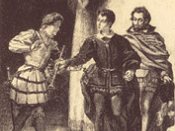Claudius, brother to the late King Hamlet, uncle of his son, lover to his wife and illegitimate occupant of his Danish throne, is the malicious and manipulative villain in Shakespeare's tragic Hamlet. Declared a "incestuous, murderous, damned Dane", 5.2.326, by vengeful nephew Hamlet, Claudius is characterized as the cold-hearted and lustful antagonist. However, beyond his instinctively sinful human characteristics, Claudius proves to be a more cunning, compassionate and deeper enemy than most. He cleverly devises a plan to rid himself of Hamlet by sending him to England and he calms Laertes and shrewdly convinces him of his story. Moreover, when without threat to his crown, Claudius shows warm and heartfelt emotion for the Queen, Gertrude, loyal Polonius and even his slain brother, Hamlet.
Claudius is weary of the potential danger that young Hamlet's depression could cause in the wake of his father's death. The King recognizes that something must be done and shrewdly employs Rosencrantz and Guildenstern; evident in 3.1.1-4,
"And can you by no drift of conference get from him why he puts on this confusion, grating so harshly all his days of quiet with turbulent and dangerous lunacy." Furthermore, while discussing Hamlet's peculiar behavior, Claudius is not so convinced in his own power that he cannot acknowledge the potential of others, such as Hamlet. "Madness in great ones must not unwatched go" 3.1.191. Wisely, in 4.3, Claudius arranges for Hamlet to journey to England accompanied by Rosencrantz and Guildenstern. Throughout the play, Claudius intelligently controls and dictates the two old friends of Hamlet. He realizes his potential fate and prays to England in 4.3.65-67, "Do it, England, for like the hectic in my blood he rages and thou must cure me." Eventually Claudius' attempt to rid his kingdom of Hamlet fails but his attempt was not that of a desperate man as much as that of a ruthless and keen ruler.
Upon news of his fathers death, Laertes returns with a vengeance, 4.5.130-133: "How came he dead? I'll not be juggled with. To hell allegiance, vows to the blackest devil, conscience and grace to the profoundest pit! I dare damnation." Laertes is understandably outraged and threatens the life of any man involved in the murder of his father. With his reign and life on the line, Claudius maintains his composure and intelligence. Claudius proves what a great and manipulative leader he is capable of being by being able to appease and persuade the enraged Laertes.
"I must commune with your grief, or you deny me right. Go but apart, make choice of whom your wisest friends you will and they shall hear and judge 'twixt you and me, if by direct or by collateral hand they find us touched we will our kingdom give, our crown, our life and all that we call ours, to you in satisfaction; but if not, be you content to lend your patience to us, and we shall jointly labor with your soul to it due content" Claudius to Laertes 4.5.200-209 Claudius soothes Laertes and convinces him that he is not responsible for his father's death and calls Laertes to his character to seek the truth first and act second. Finally, in 4.5.216, the King performs a great act of self-preservation and wisdom; he agrees that Laertes will have his revenge on the murderer of his father, "And where th' offense is, let the great ax fall." The most recurring portion of King Claudius' humanity is his genuine compassion, concern and even guilt for his brother, Gertrude and Polonius. In his soliloquy in 3.3.36-72, Claudius ponders his sinful resume and considers his own fate. He shows regret and sympathy for "the primal eldest curse upon't, a brother's murder." Additionally, Claudius shows true signs of love and affection for the Queen. He consoles her in 4.5 upon witnessing Ophelia's madness and she reciprocates by pleading the King's innocence to Laertes. The most compelling example is in 5.2.292 when Claudius implores, "Gertrude, do not drink!" He sorrowfully has to grasp that "it is too late." In 4.1, following the murder of Polonius Claudius recognizes it as a "heavy" and a "vile deed." He explains his sentiment for Polonius and his death to Hamlet in 4.3.41, "we do tender as we dearly grieve" and again to Laertes in 4.5.150, "(I) am most sensibly in grief for it." Claudius commits the ghastly act of murdering ones brother and of stealing his wife and crown. Yet, there is no one who knows his own malevolence and the wickedness of his acts more than Claudius himself. Claudius was indeed a calculating and merciless politician, envious of power; yet it was through his intellect that he was capable of reaching his goals. In the end, Claudius' own clever conspiracies and harsh human instincts were the cause of his demise.





